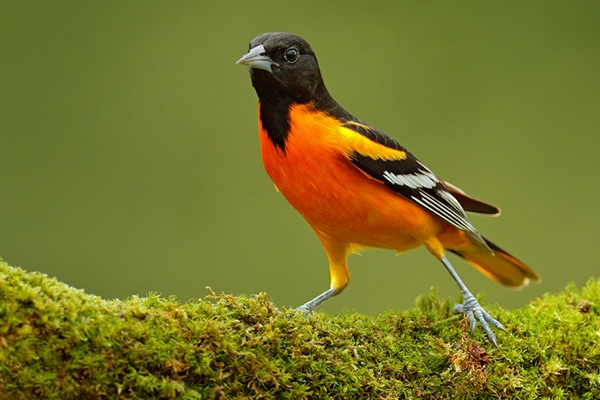Contents
When summer comes, we all look forward to seeing the beautiful and vibrant colors of birds around us. But other than the beautiful spread of colors, another thing that we all look forward to is the lovely song they sing.
One particular songbird known to sing the most beautiful tunes is the Baltimore Oriole. A naturalist in the early 20th century named Gene Stratton-Porter even described the Baltimore Orioles song as so sweet that it automatically puts happiness to anyone who hears it.
In this article, we will talk about the many sounds Baltimore Oriole makes and how you can tell what they’re trying to say.
If you’re an avid listener of birds and want to immediately pinpoint a Baltimore Oriole from the rest, you might be interested to know more about this topic.
What are Baltimore Orioles
The Baltimore Oriole is the state bird of Maryland. They are small songbirds known for their black and bright orange plumage – the same color of England’s Baltimore family’s crest they are named after.
These birds are widespread, mainly breeding in easter parts of the United States while wintering in Mexico and northern parts of South America. They are often in open areas such as forest edges, riverbanks, and other areas with small trees or shrubs.
Baltimore Orioles love insects, fruit, and nectar. They are also frequent visitors of backyard feeders, giving lots of people the opportunity to enjoy their beautiful colors and sweet songs.
The Baltimore Oriole Song
The songs of Baltimore Orioles are described to be clean, flowy, and whistling. The male birds are the ones who play the tunes to attract mates or defend their territories.
If you listen closely to their song, you’ll hear a short series of paired notes repeated several times and last 1-2 seconds. You’ll also notice that it sounds like a flute with its notes clearly heard wherever you go.
While male birds sing to attract mates, female birds let out some short notes as simple answers to the calls of the male bird. This means that if you hear some singing around you, there’s a good chance that you’re hearing a male Baltimore Oriole.
Watch this video of a Baltimore Oriole singing:
Reasons Why Baltimore Orioles Sing
Generally, birds sing as a way to communicate. So there are only four reasons why they would sing:
- Courtship
- Alarm
- Defense
- Defending the nest (for female birds)
- Fledgling call
Let’s take a look at these different calls:
Courtship Call
The mating season for Baltimore Orioles starts in late April to early May. The male birds arrive first in the territory and prepare for the arrival of the female birds.
To attract the female birds, they would sing, chatter, and hop from one branch to another to get the attention of the females. They would not stop until they found a mate.
Once they gain the female birds’ interest, the male Baltimore Oriole will bow and spread his wings and tail, to which the female birds would respond with singing and quivering of her wings.
Alarm Call
The next kind of sound you’ll hear from the Baltimore Oriole is their alarm call or what most people call the “chatter call”. This is a 2-30 repetition of just the same note.
Both male and female birds do this when they are in an aggressive or threatening situation. This call can be used whether the fight is between males, between females, or between a male and a female bird.
Defense Call
Like most birds, Baltimore Orioles would also let out an aggressive call when they are threatened and want to defend themselves. Both male and female birds do this call, which is usually heard as short, sharp, and more aggressive than the alarm calls.
Defending The Nest Call
While males search for food, female birds are left in the nest to care for their eggs or fledglings. Because of this, they are often visited by predators wanting to take their eggs. And if this happens, female birds let out a strong scream to shoo the attacker away from their nest.
Fledgling Call
The fledgling call is what we also call the begging call. This is the first sound Baltimore Orioles produced when they’re young. It’s often used to signal parents when they’re hungry. The begging call is characterized by very high and sharp notes that come in twos.
Attract Baltimore Orioles To Your Backyard!
Click the button below to learn how to attract these wonderful songbirds to your yard.
FAQs On What Do Orioles Baltimore Orioles Sound Like
What kind of sound does a Baltimore Oriole make?
The Baltimore Oriole sound is pure, flowy, and flutelike. It’s often a short series of paired notes that they repeat 2-7 times and lasts for 1-2 seconds. It’s a very beautiful tune that many bird watchers love hearing as it brightens up their day.
Do orioles sing at night?
Now, orioles don’t sing at night. If you’re hearing the tune of orioles at night, these are most likely immature or unmated birds.
Breeding orioles will only sing to attract mates, and once they do, their songs are sung to defend their territory.
When can you hear the Baltimore Orioles singing the most?
Baltimore Orioles are also called the herald of springtime because you’ll hear their beautiful songs once spring and breeding season come.
Final Thoughts On The Baltimore Oriole Song
In summary, the Baltimore Orioles are one of the best singers in the bird kingdom. Their songs are soft, gentle, and come with a happy melody that can brighten up anyone’s day. Their tunes are also distinguishable from other bird species and are usually the first thing you’ll hear in the daytime.

